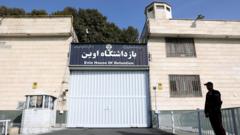Following US strikes on Iranian nuclear facilities, President Trump has ignited discussions surrounding possible regime change in Iran, despite assurances from other officials that this was not the intent. The geopolitical landscape intensifies as Iran vows consequences, while military preparedness heightens in the region.
Trump Raises Eyebrows with Regime Change Speculation Post-Iran Strikes

Trump Raises Eyebrows with Regime Change Speculation Post-Iran Strikes
Amid escalating tensions and military actions against Iran, President Trump suggests a potential leadership overhaul in Tehran, sparking controversy.
In a surprising turn of events, US President Donald Trump has stirred speculation about regime change in Iran following military strikes aimed at the country's nuclear program. In a social media post on Sunday, Trump provocatively questioned, "why wouldn't there be a Regime change???", seemingly at odds with statements from senior US officials who have clarified that the recent actions were not aimed at toppling Iran's leadership.
The strikes, conducted on Saturday and involving US bombers targeting three Iranian sites, were part of a broader coalition effort alongside Israel to curtail nuclear advancements that both Trump and Israeli Prime Minister Benjamin Netanyahu believe could lead to weaponization. Despite Iran’s consistent denials of weaponization wishes, the situation has turned increasingly volatile. Trump touted the operation as causing "monumental damage," but the actual extent of the destruction remains uncertain. In response, Iran expressed righteous indignation, indicating severe repercussions against perceived aggressors.
Global anticipations heightened when Iranian state TV announced that the parliament had voted in favor of closing the Strait of Hormuz—a vital passage for oil and gas trade— in retaliation. Meanwhile, the Israeli military reported retaliatory actions, claiming it had launched missiles toward Israel from Iran.
The US Department of State has elevated warning levels for American citizens worldwide amidst fears of escalating conflict in the region. Defense Secretary Pete Hegseth and Vice-President JD Vance have both reiterated that the US mission does not involve regime change, a position that contrasts with Trump's comments and potentially fuels domestic opposition to his foreign policy strategies. Congressman Thomas Massie labeled Trump's initiative as unconstitutional, urging Congressional approval for military involvement.
As Trump navigates these geopolitical waters, he faces pushback from various factions within his party, even as some supporters view his actions as necessary for national security. With US forces on high alert, attention now turns to Iran's next steps and the broader implications for international stability.





















